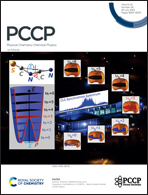Fragment-based approach for the efficient calculation of the refractive index of metal–organic frameworks†‡
Abstract
Increasing demands on materials in the field of optical applications require novel materials. Metal–organic frameworks (MOFs) are a prominent class of hybrid inorganic–organic materials with a modular layout. This allows the fine-tuning of their optical properties and the tailored design of optical systems. In the present theoretical study, an efficient method to calculate the refractive index (RI) of MOFs is introduced. For this purpose, the MOF is split into disjoint fragments, the linkers and the inorganic building units. The latter are disassembled until metal ions are obtained. The static polarizabilities are calculated individually using molecular density functional theory (DFT). From these, the MOF's RI is calculated. To obtain suitable polarizabilities, an exchange–correlation functional benchmark was performed first. Subsequently, this fragment-based approach was applied to a set of 24 MOFs including Zr-based MOFs and ZIFs. The calculated RI values were compared to the experimental values and validated using HSE06 hybrid functional DFT calculations with periodic boundary conditions. The examination of the MOF set revealed a speed up of the RI calculations by the fragment-based approach of up to 600 times with an estimated maximal deviation from the periodic DFT results below 4%.



 Please wait while we load your content...
Please wait while we load your content...